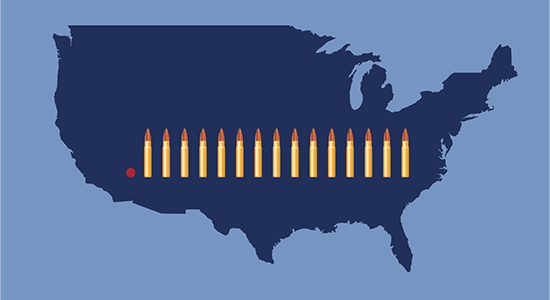|
The horrors of mass shootings continue to pervade our social media feeds. According to the National Gun Archive, as of June 1, 2023, there have been 267 mass shootings across the United States. Along with untold human suffering, these incidents expose schools, workplaces, stores and virtually any entity that operates in a place where people gather to massive financial liabilities. Originally, policyholders looked to their Commercial General Liability (CGL) insurance policies for coverage. However, due to the increasing use of exclusions and narrow insurance company interpretations of policy language, coupled with the increased rate of these occurrences, demand has risen for Active Shooter policies or endorsements to bridge the gaps in coverage created by the insurance industry.

Traditional Insurance Policies
CGL policies should cover core liabilities and expenses resulting from shooting events. But coverage may be limited, or denied altogether, by various policy exclusions — and insurance companies’ sometimes overbroad interpretation of them. Some policies exclude coverage when an employee is a perpetrator. Others exclude gun-related violence entirely. Other policies may explicitly exclude coverage for bodily injury or property damage resulting from “a criminal act or omission.” Insurance companies may attempt to apply terrorism exclusions in some cases. Outrageously, some insurance companies will characterize employees being shot as a worker’s compensation event. When coverage itself is not in question, general liability policies may not provide coverage for crisis management expenses, counseling, or temporary security measures.
Property insurance will likely cover repair costs for direct damage to facilities. It is not uncommon, however, that school districts or other owners of facilities in which a mass shooting occurs feel compelled by the event’s emotional impact to demolish the premises and build a new structure. Property insurance companies may argue that the policy does not cover such a full replacement. Property policies may also condition business interruption coverage on physical property damage. Without actual damage done to the building or contents sufficient to shut it down temporarily, the insurance company may argue that coverage may not be triggered. But after a shooting event, while the physical structure itself might have sustained relatively minimal damage, the business might not resume operations for months, if ever.
Active Shooter Insurance
The insurance industry’s exclusion of coverage from CGL coverage has caused a demand for stand-alone active shooter insurance policies or endorsements — all at an extra premium. These policies typically are triggered by a premeditated malicious physical attack by active assailants who physically are present and armed. This coverage purports to cover death and disability benefits, funeral and burial expenses, trauma counselling, rehabilitation, loss of income, medical coverage, litigation and business interruption. Some enhanced coverage also will provide crisis management centers and rebuild damaged property. Other benefits might include costs related to handling media coverage and public perception, and other emergency response services such as temporary security and setting up a call center. Insurance companies also may offer reduced premiums if preventative services or risk management vulnerability assessments are preferred and followed.
As with any other insurance product, however, prospective policyholders should be keenly aware of any exclusions that might limit or preclude coverage. Such exclusions can include employee liability exclusions, limiting coverage to only guests or visitor victim claims; damage caused by vehicles or knives; and workers compensation. Other coverage pitfalls can include policy terms that seek to cap coverage at a certain number of casualties. Further, coverage limits will vary based on a variety of factors, including the venue, location and number of employees and visitors.
As society continues to experience increasing gun violence, entities should not sit on the fence and hope that such an incident will not happen to them. Although we all like to think it will not be us, we are all at risk, and entities must be prepared in order to protect themselves and those affected in the event of a shooting incident.
» Print/Download a PDF version

|
|
SeÁn McCabe is an attorney in the New York office of Anderson Kill and a member of the firm’s Government Enforcement, Internal Investigation and White-Collar Defense Group. His areas of practice include white-collar defense, federal criminal defense, and international commercial litigation. Seán has had a key role in trial preparation and legal research on federal criminal cases arising out of the Southern District of New York, including major white-collar criminal cases, conspiracy, and RICO cases.
|
|
DID YOU KNOW?
Anderson Kill offers a full range of private client services, including estate planning, trust and estate administration, tax advice and tax return preparation.
To learn more about the firm's Wills, Trusts and Estates Group, please contact: Christopher C. Gerard, Chair, at (212) 278-1031 or cgerard@andersonkill.com.
Subscribe to the Wills, Trusts and Estates Advisory
(or any of our other complimentary newsletters).
Based in New York City, the firm also has offices in Newark, NJ, Philadelphia, PA, Washington, DC, Stamford, CT, Los Angeles, CA, Denver, CO, and Boston, MA.
©2023 Anderson Kill P.C.
This was prepared by Anderson Kill P.C. to provide information of interest to readers. Distribution of this publication does not establish an attorney-client relationship or provide legal advice. Prior results do not guarantee a similar outcome. Future developments may supersede this information. We invite you to contact the authors with any questions.
ATTORNEY ADVERTISING
|

